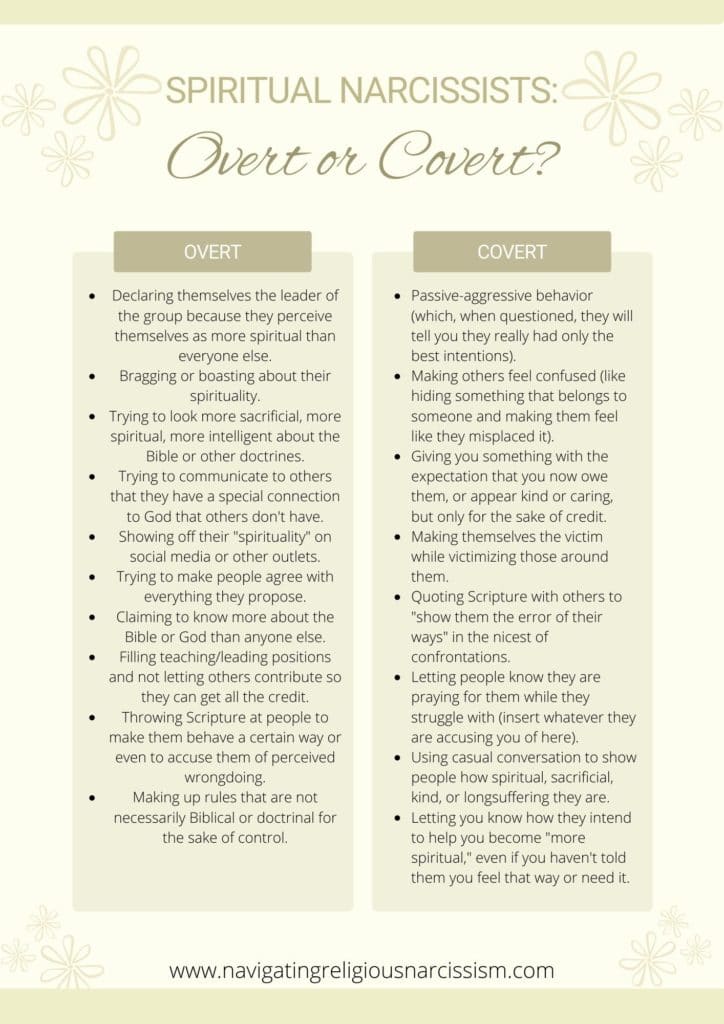Reviewed by Karis A. Williams, MSMHC, LPC, December 18 , 2023
Dr. Linda Martinez-Lewi said in The Narcissist in Your Life Podcast, “There is a special kind of covert narcissist who plays the martyr role so convincingly that most people believe they are an individual of extraordinary integrity. There is always the implication that this person is special because of their extreme self sacrifice for others. Nothing could be further from the truth. This is part of the covert narcissist’s well rehearsed performance and an excellent way of being seen as a very fine human being.”
This quote does a great job of answering the question of whether spiritual narcissists are overt or covert. The vast majority of spiritual narcissists are covert because it allows them to be narcissistic while looking godly, humble, and sacrificial. But there are certainly some overt spiritual narcissists out there too. Those tend to be the televangelist, in-the-spotlight type personalities.
Let’s take a look at some more details of overt versus covert spiritual narcissists.
Table of Contents
What is an Overt vs. Covert Narcissist?
The identifying marks of a narcissist, as seen in the DSM-5, are virtually the same for both covert and overt narcissists. But the ways they manifest their narcissism are vastly different. And in religious circles, this is a pretty big deal.
According to the DSM-5 (Diagnostic and Statistical Manual of Mental Disorders, 5th Edition, published by the American Psychiatric Association), someone who has at least 5 of the following 9 traits is considered to have Narcissistic Personality Disorder. (Note: this is different than having narcissistic tendencies.)
1. Has a grandiose sense of self-importance (e.g., exaggerates achievements and talents, expects to be recognized as superior without commensurate achievements).
2. Is preoccupied with fantasies of unlimited success, power, brilliance, beauty, or ideal love.
3. Believes that he or she is “special” and unique and can only be understood by, or should associate with, other special or highstatus people (or institutions).
4. Requires excessive admiration.
5. Has a sense of entitlement, i.e., unreasonable expectations of especially favorable treatment or automatic compliance with his or her expectations.
6. Is interpersonally exploitative, i.e., takes advantage of others to achieve his or her own ends.
7. Lacks empathy: is unwilling to recognize or identify with the feelings and needs of others. 8. Is often envious of others or believes that others are envious of him or her.
9. Shows arrogant, haughty behaviors or attitudes.
So, how does this look different for overt vs. covert narcissists? Overt narcissists will want to be seen and glorified. They want to be the center of attention and won’t hide it.
That does not work so well in religious circles. Narcissists operating in the church need to be seen as the best Christian. And some of the most religious traits are humility, self-control, and kindness, to name a few.
*Note: For the best resources on understanding, healing from, and dealing with religious narcissism, click here!
What’s the Difference Between a Covert and Overt Narcissist?
All narcissists are extremely self absorbed. They want all of the accolades, whether they deserve them or not. Except they will always think that they deserve them.
The difference lies in how they pursue those accolades. An overt narcissist will shout from the rooftops that they are the most qualified and worthy of praise and reward. They want to be seen and heard by all. Most narcissists want to be the center of attention, the life of the party. They have such a sense of self importance that they are literally unable to see anyone else in the room for anything other than how to advance themselves in popularity or importance. And they lack any empathy for anyone else.
Covert narcissists, on the other hand, want the accolades and attention just as much as the overt narcissist. And they totally lack empathy for others as well. But their means of getting there can look drastically different. They are, however, much more understated on how they achieve this.
Some of those methods can be:
- Passive-aggressive behavior (which, when questioned, they will tell you they really had only the best intentions).
- Making others feel confused (like hiding something that belongs to someone and making them feel like they misplaced it).
- Giving you something with the expectation that you now owe them, or appear kind or caring, but only for the sake of credit.
- Making themselves the victim while victimizing those around them.
- Quoting Scripture with others to “show them the error of their ways” in the nicest of confrontations.
- Letting people know they are praying for them while they struggle with (insert whatever they are accusing you of here).
- Using casual conversation to show people how spiritual, sacrificial, kind, or longsuffering they are.
- Letting you know how they intend to help you become “more spiritual,” even if you haven’t told them you feel that way or need it.

Why it is So Important For a Spiritual Narcissist to be Covert?
The biggest reason a spiritual narcissist needs to be covert instead of overt is because he needs to exhibit humility, grace towards others, forgiveness, and love. If the narcissist is overt, he won’t have an ounce of these characteristics in him. These are all characteristics that do NOT call attention to the person. So, even though they want the accolades and credit, they need to get it in ways that don’t seem overt. They need to make others see them by pointing to themselves in secretive ways. Then, when someone does give them praise, it doesn’t seem like they were digging for that praise.
Everything they do is literally the opposite of what it appears to be. While they are selfish, they will try to convince you of how giving they are so you will give to them in return. When they are judgmental, they will make it seem as though you are–but they will do it in the nicest, nonjudgmental words. It truly is confusing and goes way deeper than this. The problem is, you give them the benefit of the doubt because you don’t want to think people could be so underhanded. And they take advantage of that too!
Often, it takes years for people to realize what the covert narcissist is doing to them. Hiding behind Christianity is the perfect cover. It allows them to be seen as humble, servant-oriented, or kind automatically. Then they can continue to manipulate your thinking for years to come, mostly because you think a Christian could never do such things.
What Happens When a Spiritual Narcissist is Overt?
Some narcissists actually will present as overt, in spite of the need to appear contrite, godly, and humble. Here are some of the ways they can do it:
- Declaring themselves the leader of the group because they perceive themselves as more spiritual than everyone else.
- Bragging or boasting about their spirituality.
- Trying to look more sacrificial, more spiritual, more intelligent about the Bible or other doctrines.
- Trying to communicate to others that they have a special connection to God that others don’t have.
- Showing off their “spirituality” on social media or other outlets.
- Trying to make people agree with everything they propose.
- Claiming to know more about the Bible or God than anyone else.
- Filling teaching/leading positions and not letting others contribute so they can get all the credit.
- Throwing Scripture at people to make them behave a certain way or even to accuse them of perceived wrongdoing.
- Making up rules that are not necessarily Biblical or doctrinal for the sake of control.

This list will get you started. As you experience covert or overt spiritual narcissists, you will see even more patterns emerge like these.
Overt spiritual narcissists tend to be the ones in positions of leadership: priest, pastor, heads of committees, even lay leaders. The longer they are in positions of power, the more narcissistic they become. And then it is very hard to remove them from the position and save the religious institution they are part of. Their behavior is so insidious and hard to prove. And they will say or do whatever they can to shift the blame and continue in their narcissistic behavior.
Conclusion
So, to answer the question, “Are Spiritual Narcissists Overt or Covert?” they usually try to present as covert because it is easier to hide in religious circles. But they can also be overt, especially when in positions of leadership.
The best thing you can do when you realize someone is indeed a spiritual narcissist is to walk quietly away. But it is also important to let them and the proper authorities know why you are walking away. If you don’t do this, they will continue to destroy the lives of fellow members of their religious organization in order to continue to get the supply they so desperately need.
If you liked this article, I think you will also love the following articles:
Religious Trauma Syndrome: How to Preserve Your Spirituality
How to Navigate Religious Narcissistic Parents
What Happens to the Soul of a Narcissist?
How to Heal From a Spiritual Narcissist
Can You Maintain a Relationship With a Spiritual Narcissist?
Can Narcissists Have a Spiritual Awakening?
How Will God Judge a Narcissist?
When the Church Says to Move Back in With Your Narcissist
What Can We Say to a Friend Who’s Divorcing
23 Reasons Why Narcissists are Drawn to the Church
When the Church Doesn’t Recognize Narcissistic Abuse
Will the Church Support Divorcing a Narcissist?
What Does the Bible Say About Narcissism?
Can a Spiritual Narcissist Heal?
Can a Narcissist Be a Christian?
What Does the Spiritual Narcissist Do When You Try to Leave?
- How to Choose the Best Attorney When Divorcing a Narcissist - March 23, 2024
- Why Won’t God Heal my Narcissist? - February 28, 2024
- How Narcissists Use Religion to Control and Manipulate You - December 26, 2023





